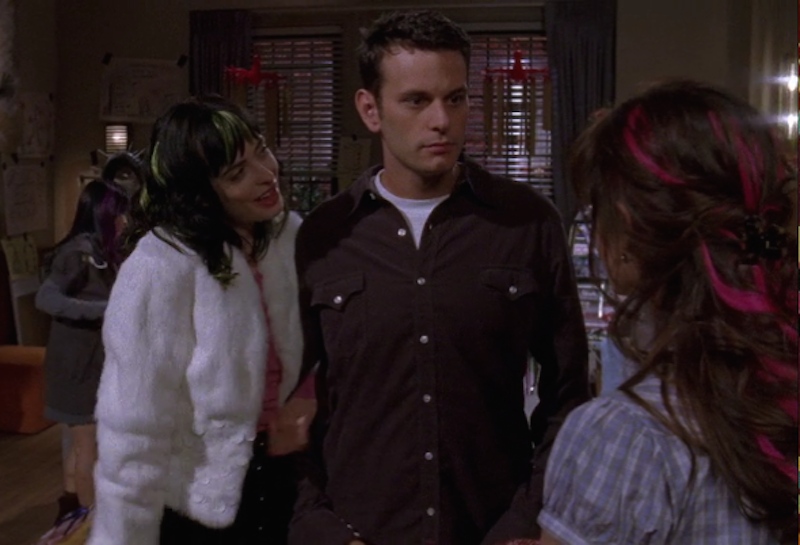How Gilmore Girls Do Money: Marty

“So,” the therapist said, “let’s talk about why you’re here.”
“I guess I feel like nobody sees me,” Marty said. “Like, I’m in a lot of people’s lives but I’m not important to anyone. I mean, I don’t have to be important, that makes me sound like I want to be special or something, I don’t want to be that guy who always wants to be the center of attention, but…”
Marty had no idea what he was supposed to say. He had the vague idea that he was supposed to cry at some point, because there was a tissue box next to him on the couch as well as another box on the side table.
“My college girlfriend called me boyfriend,” he said. “Not my name.”
“Some people use terms like that to communicate love,” the therapist said. “Did that feel like love to you?”
“It felt like I was just there,” Marty said. “Because she needed a boyfriend. She’s famous now, by the way. Should I tell you? Who she is?”
“I don’t need to know,” the therapist said. “How else do you feel like nobody sees you?”
“Well, when I was in college, I used to work these part-time jobs to make extra money. I went to Yale. You’re supposed to be on an equal footing with everyone, like you’re just as good as them, except you’re not. I had to work, which meant that everyone saw me as the guy who poured their coffee and bartended their parties. They didn’t see me as someone they wanted to become business partners with.”
“What about your friends?”
“I even bartended my girlfriend’s birthday party, and she’s famous, she’s on TV, and the guy who treated me like crap just sold his company, and—”
Marty paused, because he was going to mention Rory, and he had to think about how he wanted to tell his therapist about Rory.
“Did you have any friends?” the therapist asked again. “How did they treat you?”
“Okay,” Marty said. “So there was this girl. She was really nice to me at the beginning because—well, there was this party, I kinda ended up naked, and I didn’t want people to call me Naked Guy. And I thought we were friends, except she only liked to hang out with me when she wasn’t with her group of cooler friends. Like, she was in one of those Yale secret societies. And then she started dating one of them.”
Marty paused. “I guess I thought that she liked me because she was hanging out with me, and I kinda felt like she was my best friend for a while, except she started dating this other guy, so I guess she wasn’t. And when your best friend doesn’t even see you as their best friend, you aren’t important to anyone.”
He picked up the box of tissues and began fidgeting with it, not crying, but pinching the cardboard corners and squeezing the box at its edges. “She’s not famous but people write about her sometimes, and she writes too, I can send you links to her stuff, and she always writes about these three guys she knew, the three guys who changed her life. And they’re not me. None of those guys are me.”
“I want to talk more about your past, because that’s an important part of who you are—and I want to talk about your family, too, because you haven’t mentioned them yet—but first I’m curious if you feel like the experiences you had in college are continuing to affect your life now,” the therapist said.
“I mean, yeah, that’s why I felt like I needed to talk to someone.” Marty was frustrated that his therapist hadn’t picked up on this; it was just one more example of how nobody really paid attention to him. “I go to work and I say things and then someone else says something and they go with that idea, and I walk into the break room and there are a bunch of people having lunch and I wasn’t invited, and my email isn’t even my own name. It’s info.”
That was when Marty started crying. “I don’t even think they know my name, like, they know it’s Marty but they don’t know my last name, and I go on Facebook and I look up the people I knew from Yale and they’re famous, and they’re rich, and I friend them and they ignore me.”
“All right,” the therapist said. “Before you come back next week I’d like you to spend some time thinking about people who have felt like good friends, or people who liked you for who you are. We can work on identifying those people in your current life, and maybe talk about trusting or building those connections.”
Marty left the therapist’s office angry, because he had just paid $247 for an hour with a therapist who had completely misunderstood why he was there. He didn’t want to find new friends; he wanted to know why the friends he wanted didn’t want him. Once he figured that out, he could fix everything.
Previously on How Gilmore Girls Do Money: Sookie St. James and Jackson Belleville
Support The Billfold
The Billfold continues to exist thanks to support from our readers. Help us continue to do our work by making a monthly pledge on Patreon or a one-time-only contribution through PayPal.
Comments